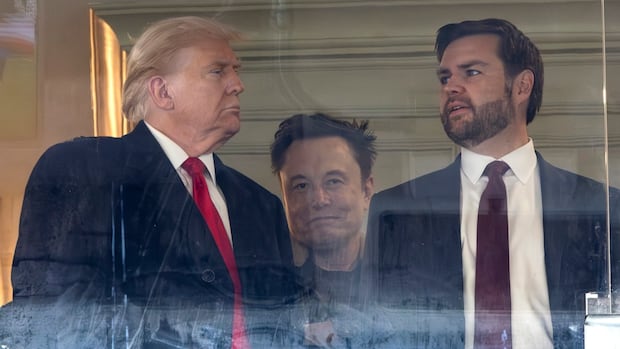President-elect Donald Trump delivered a likely death blow to bipartisan congressional budget negotiations, rejecting the measure as full of giveaways to Democrats after unelected billionaire ally Elon Musk whipped up outrage toward the bill and cheered on Republican lawmakers who announced their opposition to it.
As a result, a partial shutdown of the U.S. government could begin on Saturday. Based on previous shutdowns, it could lead to government services that are funded by Congress being subject to delays or closures, with thousands of non-essential employees furloughed and essential employees working temporarily without pay.
There were two government shutdowns in Trump’s first presidency, both ostensibly related to his demands regarding border security funding — a dayslong affair in January 2018 and the longest-ever on record for five weeks over late 2018 and early 2019.
Trump’s joint statement Wednesday with vice-president-elect J.D. Vance stopped the bill in its tracks and punctuated a torrent of social media posts by Musk attacking the legislation for what he described as excessive spending.
“Stop the steal of your tax dollars!” Musk wrote on his social media platform X as he dangled primary challenges against anyone who voted for the budget deal. Musk pumped an estimated $200 million US into his own political action committee to help elect Trump.
The U.S. government reached a tentative deal to raise the debt ceiling just days before the deadline. Nearly every year it brings the country — and the world — to the brink of economic catastrophe over the debt ceiling. Andrew Chang explains what the debt ceiling is, and what would happen if it wasn’t raised.
Musk also encouraged Americans to contact their federal representatives to express disapproval of their bill.
Rep. Andy Barr, a Republican from Kentucky, said his office was flooded with calls from constituents.
“My phone was ringing off the hook,” he said. “The people who elected us are listening to Elon Musk.”
The Republicans came in for blistering criticism from, among others, Bernie Sanders of Vermont, an independent who caucuses with the Democrats.
“Democrats and Republicans spent months negotiating a bipartisan agreement to fund our government.The richest man on Earth, President Elon Musk, doesn’t like it. Will Republicans kiss the ring?” Sanders wrote on X on Wednesday.
Conflicts appear to be abundant
The episode showcased the growing political influence of Musk, whom Trump has selected alongside entrepreneur Vivek Ramaswamy to spearhead the Department of Government Efficiency, a nongovernmental task force formed to find ways to fire federal workers, cut programs and reduce regulations.
Musk’s companies all intersect with the federal government and are subject to regulation in various ways. SpaceX holds billions of dollars in NASA contracts and he’s CEO of Tesla, the electric car business that benefits from government tax incentives and is subject to auto safety rules.

Musk’s purchase of social media platform Twitter, which was rebranded X in 2023 and is still prominently used by politicians and governments, has been probed for improprieties by the Securities and Exchange Commission (SEC). His other companies include artificial intelligence startup xAI and brain implant maker Neuralink.
“There’s direct conflicts between his businesses and government’s interest,” Ann Skeet, director of leadership ethics at Santa Clara University, told the Associated Press last month. “He’s now in a position to try and curry favour for those enterprises.”
Grover Norquist, president of Americans for Tax Reform and a veteran of Washington’s budget battles, has been enthusiastic about Musk’s ability to generate public attention for efforts to reduce the size of government. But he suggested the owner of a space rocket company wasn’t the right person to spearhead a congressional spending debate.
“He doesn’t know politics like he knows physics,” he said.
Others were thrilled with Musk’s involvement.
“In five years in Congress, I’ve been awaiting a fundamental change in the dynamic,” posted Rep. Dan Bishop, a Republican from North Carolina. “It has arrived.”
In a post on X, Kentucky Republican Sen. Rand Paul even floated Musk’s name as a possible speaker, seeming to relish in the possibilities of “seeing the collective establishment … lose their ever-lovin’ minds.”
The Speaker of the House need not be a member of Congress . . .
Nothing would disrupt the swamp more than electing Elon Musk . . . think about it . . . nothing’s impossible. (not to mention the joy at seeing the collective establishment, aka ‘uniparty,’ lose their ever-lovin’…
—@RandPaul
Amplified false claims
Trump’s opposition to what was considered must-pass legislation renewed a sense of uncertainty and political brinkmanship in Washington that was reminiscent of his first term in office.
It was a dramatic turn of events for House Speaker Mike Johnson, who negotiated the bill and has been undermined by Trump as he faces reelection for his post in just a couple of weeks.
Republicans have a slim majority, raising the possibility of a replay of leadership disputes that paralyzed the House a year ago in the final weeks of Kevin McCarthy’s time as Speaker, and the early weeks of Johnson’s tenure.
The Biden administration criticized the possibility of a shutdown.
“Republicans need to stop playing politics with this bipartisan agreement or they will hurt hard-working Americans and create instability across the country,” said White House press secretary Karine Jean-Pierre.
In his social media posts, Musk sometimes amplified false claims, such as the idea that the legislation included $3 billion for a new football stadium in Washington. In reality, the legislation would transfer ownership of the land from the federal government to the city, paving the way for eventual development.
“I love you Elon but you need to take 5 seconds to check your sources before highlighting bottom feeders looking for clicks,” Texas Republican Rep. Dan Crenshaw said on X.
Democratic House Minority Leader Hakeem Jeffries said any fallout from a government shutdown would be solely on the Republicans.
“You break the bipartisan agreement, you own the consequences that follow,” he wrote on X.
With respect to Trump, earlier this year, his disapproval led to Republicans backing away from a wide-ranging bipartisan bill that would have enhanced border security measures.



